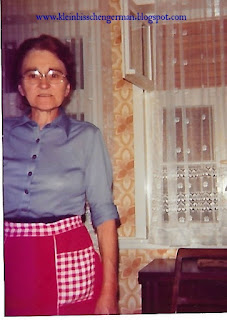My
Oma was born in 1918 in
Gross Lattana, East Prussia, located along the southeastern Baltic coast. Her village/town was called
Peitschendorf, and now it is called
Piecki as this area is part of Poland today. It was in the Masurian lake district - known for its 2,000 lakes.
A QUICK HISTORY LESSON:
Prussia's history is complicated - it was a providence of the German Empire after 1871; after 1918, at the end of World War I, the territory became an enclave (separated from the mainland) of the new German Republic. Between the end of 1944 and 1945, East Prussia was part of air assaults and offensives by the British army as well as invasion and siege (and atrocities) by the Russian Red Army. Many ethnic German Prussians fled - to include my Oma (at this point, married with a child, my uncle who was born in 1943) and her family, which included many of her younger siblings.
Refugees who tried to return to East Prussia were prevented, and many of those remaining were expelled by its new Communist regime. Labor camps were established; orphans from the who were left behind in this Communist zone were called "Wolf Children" and are a whole sad story unto themselves. My Oma eventually made it to Frankfurt, where my Opa's family was from, and her family eventually also came over to the West after living in Eastern Germany for a short time.
The East Prussia my Oma lived in 1923 -1939
Following Nazi Germany's defeat in World War II in 1945, East Prussia was partitioned between Poland and the Soviet Union according to the Potsdam Conference. Southern East Prussia was placed under Polish administration, while northern East Prussia was divided between the Soviet republics of Russia (the Kaliningrad Oblast) and Lithuania (the constituent counties of the Klaipėda Region). The city of Königsberg was renamed Kaliningrad in 1946. Most of the German population of the province had left during the evacuation at the end of the war, but several hundreds of thousands died during the years 1944–46 and the remainder were subsequently expelled. (source)
But back to my Oma's childhood: from her stories, it was pleasant in that the area she grew up in was beautiful, wooded land with lush forests and fertile farms. Her father was a stern man, a constable of the town. Her mother, sadly, died when my Oma was almost 7 years old of tuberculosis despite efforts to send her to a sanatorium for treatment.
This picture below is interesting - it was taken in 1921 or 1922:
The little girl in the picture ^ is my Oma: Hildegard Anna; she was born in 1918.
Her father is beside her (Gustav, 1881 - 1968). Seated is my great-grandmother (Ur-Grossmutter); her name was Anna (my daughter is named after her and my Oma); she lived from 1896 until 1925. Anna's sister Wilhelmine stands behind her - and she became my Oma's step-mother later.
ANYWAY ... back to my childhood:
My mother and I moved to the United States (Maryland - then Virginia) with my dad (an Army soldier) in 1974, right before I turned 4 years old. My Oma and Opa came to visit in 1975. Airplane travel was quite an adventure back in those days, and it was a brave endeavor for them to come with their limited English with the additional challenge of getting stuck overnight at the airport in New York City. The above 2 pictures are from this visit.
Starting in 1977, I traveled to Germany yearly, each summer after school was out, to spend about 2 1/2 months with my grandparents and other German relatives. Because my grandparents lived in the city of Frankfurt in an apartment, they rented a small garden, as many city dwellers did, to grow a few plants, enjoy some green space, and in my grandparents' case have a little hut for parties and family to hang out. This is where we came almost daily during the summers because
our garden also had rabbits to feed and cages to clean. (
click on the link to see an aerial view of the gardens now - ours was the plot closest to the railroad tracks. Today it has no grass, as the owner uses it for chickens; however, when we rented it, the surface was grass.)
VOCAB TIDBIT:
Our garden was part of a rabbit breeding club - a Kanninchenzuchtverein. How's that for a nice, long word!!? Let's break it down: Kanninchen = rabbit, Zucht = breeding, Verein = club
We showed our rabbits each year, and they were judged, kind of like the Kennel Club's dog show you might be familiar with.
Kanninchen = rabbit; schau = show
So it was at this little garden that I spent many happy hours playing - on my swing, in my playhouse, in the hut, and with other children whose families were a part of the club.

Me & my Oma - ca. 1977 or '78.
Is it crazy that I remember those flip flops that I have on? They straps were made of velvet and the foot bed was straw, kind of like these:
But better than the memory of my awesome shoes is the memory of having fun with my Oma!
You can also ready my Opa's Story:
here














































